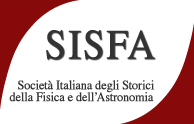Speaker
Description
“History of science without philosophy of science is blind. Philosophy of science withouth history of science is useless.” This Lakatos’ motto (of Kantian origin) dominated the panorama of the historians of science in the period 1960-1980. This effort to connect history and philosophy about the study of physics however was only a partial success.
The externalist view of the history of science was able to suggest only some case study of interest. About the internalist view, Koyré study of the birth of modern science gained the position of a classic, but it concerns the birth only, not even Newton’s case. The celebrated Kuhn’s analysis failed face at quantum mechanics, and also its account of classical physics was contested on the base of radical criticisms. Lakatos’ was unsuccessful in find out a case-study confirming his methodological suggestions. The structuralist view of Physics built a brilliant spiderweb which however is detached from the common view on the physical theories.
A disenchantment followed. A new panorama followed. By assuming that classical physics is unproblematic the growing the number of professional historians focused the attention on the accumulation of even more studies of quantum mechanics and contemporary physics. What was unachievable from the top of a philosophical categories, is looked for from the bottom of an inductive attitude from detailed studies of as more as possible historical cases and event. In such a way what has not been achieved by the above philosophical viewpoint - i.e. to decisively turn the attention of physicist community to history of physics -, was achieved by a quantitative growth of historical case-studies on the physics of the last times.
However, historians of science have no detailed mathematical and no scientific knowledge, and whereas physicists write “historical papers” without any history. History of science, and in particular history of physics, was reduced to a mere “historical history”, a philosophically neutral history centered on some myths of foundations (Galileo, Newton, Darwin, Einstein) and on micro-histories without any macro-historical meaning. The application of complexity theory to history was used to deconstruct the “great narratives”: scientific method, modern science, scientific revolution, incommensurability became lost concepts. There is no longer a general frame. But in such a way history of science remained undertheorized, when compared with other fields. Actually, history of physics has not really had achieved a defining methodology. In our opinion this is the main weakness of our discipline.
In present communication we will analyse the main attempts in the last 30 years to renew the program of achieving an account of history of physics capable to answer the profound question that this history suggests? We take in account the following viewpoints: 1) the feminist one on science; 2) the new analyses of classical physics suggesting a new view on modern physics; 3) the complexity theory. The analysis takes as main case-study the historical role of thermodynamic theory which as first seemed to exit out the Newtonian paradigm.
We look for the possibility of a new conceptual frame for history of science: theological, philosophical (ontological and gnoseological), ethical, conscious and unconscious presuppositions of physics, and the technical-experimental, mathematical, logical practices of modern physics as a new philosophy of Nature with its synthax, semantics and pragmatics dimensions.
